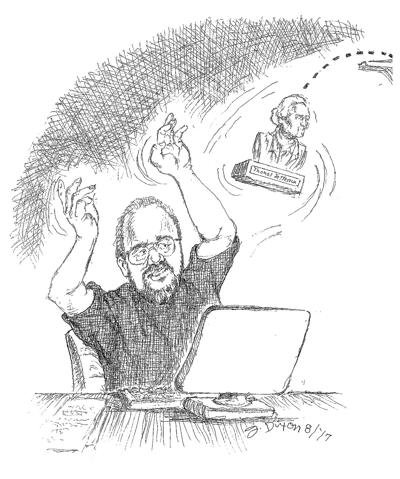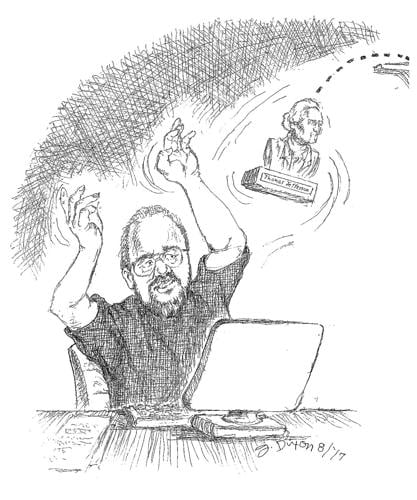A potential tragedy has been averted at Leader World Headquarters.
A weighty bust of Thomas Jefferson, our third president, has perched for years on shelves above news editor Steve Taylor’s desk.
It doesn’t take much imagination to envision a good shake to the building – the New Madrid Fault is real, unfortunately – and to picture what might happen if that bust came toppling down on Steve’s head.
The statue has been in our newsroom since 2012, donated by Robert Williams, the late owner of Sunset Realty in Hillsboro, who dispersed statues of Jefferson to libraries and businesses across Jefferson County. He died in 2015.
Our bust has a plaque with a lovely Jefferson quote: “Where the press is free and every man able to read, all is safe.”
Keith Williams, Robert’s son and present-day owner of Sunset, said his dad revered Jefferson as an American founding father and the namesake of Jefferson County (and Jefferson College, and the Jefferson R-7 School District).
“He went to Monticello (Jefferson’s Virginia home) several times and just really liked Jefferson,” Keith said. “He gave out those (busts) as a token of his appreciation.”
Our bust came to my mind because of all the noise in recent days over the statues across our country that commemorate Robert E. Lee and other Confederate leaders, many erected during the Jim Crow era, from the late-19th century to 1965.
If those statues must come down, what about Jefferson and George Washington, who not only owned slaves, but whose lives were arguably less than exemplary when it comes to this subject?
Both were squeamish about the institution of slavery, but despite their qualms, they both died as slave-owners. When slaves escaped from Mount Vernon, Washington was dogged in trying to recover his property, and Jefferson, at age 44, is purported to have started a decades-long sexual relationship with Sally Hemings, the enslaved half-sister of his dead wife, when Sally was just 14.
Yes, these men shaped the country from its earliest days and did not take up arms against it. But in a pure discussion of slavery, it’s not outlandish to think that some people, someday, might insist on makeovers for the Washington Monument, the Jefferson Memorial, the nickel and quarter coins and the $1 and $2 bills.
I certainly don’t condone that, and I can see a marked difference between our founding fathers and the leaders of the Confederacy. But as is usual when issues rise to heated public debate, this one is deeply nuanced.
Millions of American citizens descend from Confederate soldiers, and to some, those ties don’t seem so ancient. Video of protestors kicking and spitting on toppled Confederate statuary, as seen last week, might feel like an attack on antecedents like Great-Great-Great Grandpa Joe, who was desperately wrong in the cause he defended, but was not an evil man.
I’m told that one of my paternal ancestors, named Jesse like my father, fought for the Confederacy and fired a first shot, against orders, starting the bloody Civil War battle at Shiloh in 1862. On my mother’s side, here in these parts, 17-year-old Lewis Akins was murdered by Civil War bushwhackers, presumably renegade Confederates. A couple of generations later, my grandfather was named for the dead teenager.
There was tragedy on all sides of that horrific conflict, and this country is not over it.
A relative of mine died not long ago and I remember in the not-so-distant past seeing his display of a Confederate flag. The world regarded my relative as one of those “fine people” the president may have been referring to in his remarks last week. Did that one detail from my relative’s life wipe out everything else in his illustrious resume? Some people would say yes, others no. It’s tough.
We heard wise words last week from descendants of Robert E. Lee, Stonewall Jackson and Confederate President Jefferson Davis. They said, if the statues commemorating their great-greats are offensive, remove them from public venues and place them instead in historic settings. Isn’t that a compromise that should work for all?
The Leader’s bust of Thomas Jefferson remains in a place of honor here. As the quote on our bust illustrates, Jefferson was a champion of free speech. He wrote the Declaration of Independence and brought half of the United States into existence through the Louisiana Purchase, among many other accomplishments that outweigh his record on slavery. He deserves to be venerated forevermore.
But not above Steve Taylor’s desk.
We’ve moved Tom to an eye-level place of honor. Thanks, world at large, for inspiring us to protect one of our own.






